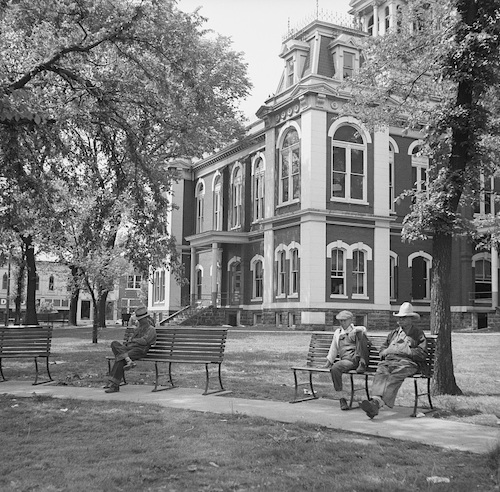Peirspictiochtai Ar An Saol
Democracy Is At Stake
Part Two
 The Cherokee County Court House in Columbus, Kansas. (The photograph was produced by Arthur Rothstein and was provided courtesy of the Library of Congress, May of 1936.)
The Cherokee County Court House in Columbus, Kansas. (The photograph was produced by Arthur Rothstein and was provided courtesy of the Library of Congress, May of 1936.)
In July, Peirspictiochtai Ar An Saol noted how news media reports have been repeating a mantra that our democracy is threatened. That American democracy is at stake. That we have never faced such a situation.
These news media reports have continued in the weeks since.
The United States of America has faced situations before when election results were, let us say, "questionable."
As an example, it might be useful to look back on how elections took place in one county in one state.
The location: Southeast Kansas.
The timing: During the years after the American Civil War.
Today, Columbus, Kansas, is recognized and operates as the county seat of Cherokee County, Kansas. The crossroads was initially named by folks who moved here as "Cherokee Center" because it was in the geographical center of the county named in honor of the Cherokee Nation. The locale – not yet an actual town at that time – was also known as "Geographical Center."
The early settlement of Columbus saw a number of twists and turns. The route that the community took to gain its status as the seat of government for Cherokee County has been questioned in years past. Allegations of fraud followed the election in 1869 that was used by leaders in Columbus to move the county seat from the nearby community of Baxter Springs.
Some background:
On February 18, 1860, the then-Governor of Kansas signed the law forming Cherokee County from the existing Magee [McGee] County. The law noted that that existing county had been attached for operational purposes to Bourbon County; with this law's passage, the two counties were formally separated. Freepoint (also spelled by some as "Free Point") was designated as the temporary county seat for Cherokee County.
The Baxter Springs News included a news article on January 24, 1885, with the headline of "Our Court House Claim." In the news article, this newspaper questioned the validity of a news article included in The Columbus Advocate on January 15, 1885.
The newspaper in Baxter Springs quoted an unnamed source that it indicated "…to be nearly if not exactly a true report of the facts as they occurred at that time [of elections in 1867, 1868, and 1869]." It appears that the unnamed source quoted in part by the Baxter Springs News was a book that had been published in 1883: William G. Cutler's History of the State of Kansas.
Quoting from the unnamed source, the Baxter Springs News reported that "Originally, the county seat was temporarily located at Freepoint, but so far as can be ascertained no business was transacted at this point, and in 1867, the county seat was temporarily located at Pleasant View. An election was held November 5, 1867, for the permanent location of the county seat. The total number of votes cast was 139, of which Baxter Springs received 136, and Cherokee Center 3."
"A vote was then taken May 12, 1868, but as no place bad received a majority of the votes, another election was held May 26, and as the result of this election Baxter Springs was declared to have received a majority of the votes, and so retained the county seat," the news article in the Baxter Springs News continued. "The geographical center of the county [today's Columbus] had competed with Baxter Springs for the prize and had lost, as many believed, through fraud. The Commissioners, therefore, upon application, granted another election which was held February 17, 1869."
The news article continued by noting that "It was firmly believed by those who favored the geographical center [today's Columbus], that if a fair election could be held, the question would be decided in their favor. But they learned through espionage that certain parties at Baxter Springs were determined to win as they had done before – by stuffing the ballot box. It was therefore decided by these favoring the geographical center [today's Columbus], to cast if necessary more fraudulent votes than Baxter Springs, and thus to win in any event. One township was thereupon selected to cast the number of votes necessary to defeat Baxter Springs no matter how many fraudulent votes the latter place might cast. This township was Lola."
The next edition of Peirspictiochtai Ar An Saol provides further details on why allegations of fraud were made regarding these elections.
Peirspictiochtai Ar An Saol – Gaelic – Irish – for "Perspectives On Life" is a column focused on aspects of accountability and responsibility as well as ways people look at life.
Contact Richard McDonough at
© 2024 Richard McDonough










